| Listing 1 - 10 of 38 | << page >> |
Sort by
|
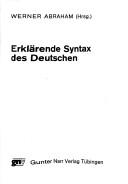
ISBN: 3878088256 9783878088257 Year: 1992 Volume: 25 Publisher: Tübingen Narr
Abstract | Keywords | Export | Availability | Bookmark
 Loading...
Loading...Choose an application
- Reference Manager
- EndNote
- RefWorks (Direct export to RefWorks)
Grammar --- German language --- Allemand (Langue) --- Syntax --- Syntaxe --- Syntax. --- 830.075 --- Duitse literatuur--?.075 --- -Duitse literatuur--?.075 --- 830.075 Duitse literatuur--?.075 --- -Ashkenazic German language --- Hochdeutsch --- Judaeo-German language (German) --- Judendeutsch language --- Judeo-German language (German) --- Jüdisch-Deutsch language --- Jüdischdeutsch language --- German language - Syntax --- German language - Syntax.
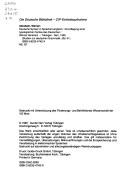
ISBN: 382334742X 9783823347422 Year: 1995 Volume: 41 Publisher: Tübingen Narr
Abstract | Keywords | Export | Availability | Bookmark
 Loading...
Loading...Choose an application
- Reference Manager
- EndNote
- RefWorks (Direct export to RefWorks)
Grammar --- German language --- Grammar, Comparative and general --- Syntax. --- 803.0-56 --- #KVHA:Grammatica; Duits --- -Grammar, Comparative and general --- -Comparative grammar --- Grammar, Philosophical --- Grammar, Universal --- Language and languages --- Philosophical grammar --- Linguistics --- Philology --- Ashkenazic German language --- Hochdeutsch --- Judaeo-German language (German) --- Judendeutsch language --- Judeo-German language (German) --- Jüdisch-Deutsch language --- Jüdischdeutsch language --- Germanic languages --- Duits: syntaxis; semantiek --- Syntax --- Grammar, Comparative --- -Duits: syntaxis; semantiek --- 803.0-56 Duits: syntaxis; semantiek --- -803.0-56 Duits: syntaxis; semantiek --- Comparative grammar --- German language - Syntax. --- Grammar, Comparative and general - Syntax. --- Grammar, Comparative and general Syntax --- DEUTSCHE SPRACHE --- SYNTAX
Book
ISBN: 3878088159 9783878088158 Year: 1982 Volume: 15 Publisher: Tübingen Narr
Abstract | Keywords | Export | Availability | Bookmark
 Loading...
Loading...Choose an application
- Reference Manager
- EndNote
- RefWorks (Direct export to RefWorks)
Lexicology. Semantics --- Grammar --- German language --- Sentences --- Syntax --- Semantics --- 830.075 --- -German language --- -Ashkenazic German language --- Hochdeutsch --- Judaeo-German language (German) --- Judendeutsch language --- Judeo-German language (German) --- Jüdisch-Deutsch language --- Jüdischdeutsch language --- Germanic languages --- Duitse literatuur--?.075 --- Semantics. --- Sentences. --- Syntax. --- -Duitse literatuur--?.075 --- 830.075 Duitse literatuur--?.075 --- German language - Sentences --- German language - Syntax --- German language - Semantics
Book
ISBN: 3484106050 9783484106055 Year: 1988 Volume: 1 Publisher: Tübingen Niemeyer
Abstract | Keywords | Export | Availability | Bookmark
 Loading...
Loading...Choose an application
- Reference Manager
- EndNote
- RefWorks (Direct export to RefWorks)
Linguistics --- Dictionaries --- German --- 803.0 <038> --- 800 <03> --- -Linguistics --- -Linguistic science --- Science of language --- Language and languages --- Duits. Duitse taalkunde--Vertaalwoordenboeken --- Taalwetenschap. Taalkunde. Linguistiek--Naslagwerken. Referentiewerken --- -German --- German. --- Dictionaries. --- -Duits. Duitse taalkunde--Vertaalwoordenboeken --- 800 <03> Taalwetenschap. Taalkunde. Linguistiek--Naslagwerken. Referentiewerken --- 803.0 <038> Duits. Duitse taalkunde--Vertaalwoordenboeken --- Linguistic science --- Dictionaries&delete& --- Linguistics - Dictionaries - German --- Linguistics - Dictionaries
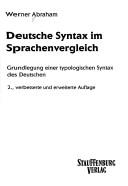
ISBN: 3860574590 9783860574591 Year: 2005 Volume: 41 Publisher: Tübingen Stauffenburg
Abstract | Keywords | Export | Availability | Bookmark
 Loading...
Loading...Choose an application
- Reference Manager
- EndNote
- RefWorks (Direct export to RefWorks)
German language --- Grammar, Comparative and general --- Syntax. --- 803.0-56 --- -Grammar, Comparative and general --- -Comparative grammar --- Grammar --- Grammar, Philosophical --- Grammar, Universal --- Language and languages --- Philosophical grammar --- Linguistics --- Philology --- Ashkenazic German language --- Hochdeutsch --- Judaeo-German language (German) --- Judendeutsch language --- Judeo-German language (German) --- Jüdisch-Deutsch language --- Jüdischdeutsch language --- Germanic languages --- Duits: syntaxis; semantiek --- Syntax --- Grammar, Comparative --- -Duits: syntaxis; semantiek --- 803.0-56 Duits: syntaxis; semantiek --- -803.0-56 Duits: syntaxis; semantiek --- Comparative grammar --- German language - Syntax. --- Grammar, Comparative and general - Syntax. --- Grammar, Comparative and general Syntax
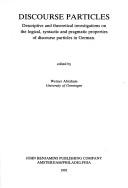
ISBN: 1283174251 9786613174253 9027283311 9789027283313 9027250227 9789027250223 1556192789 9781556192784 Year: 1991 Volume: 12 Publisher: Amsterdam Benjamins
Abstract | Keywords | Export | Availability | Bookmark
 Loading...
Loading...Choose an application
- Reference Manager
- EndNote
- RefWorks (Direct export to RefWorks)
This book is about particles in the narrower sense of the word as opposed to the broader meaning covering all uninflected words of a language. In the narrower meaning of the linguistic term particles can be distinguished between logical, or scalar particles and modal, or pragmatic particles. The semantic, pragmatic and syntactic properties of modal particles differ vastly from those of the scalar particles, on the one hand, and their homonymic counterparts functioning in different syntactic categories, on the other hand. The contributions to this volume offer the latest research on the semanti
German language --- Ashkenazic German language --- Hochdeutsch --- Judaeo-German language (German) --- Judendeutsch language --- Judeo-German language (German) --- Jüdisch-Deutsch language --- Jüdischdeutsch language --- Germanic languages --- Particles --- Interjections --- Spoken German --- 803.0-56 --- 803.0-57 --- 803.0-57 Duits: pragmatiek --- Duits: pragmatiek --- 803.0-56 Duits: syntaxis; semantiek --- Duits: syntaxis; semantiek --- Interjections&delete& --- Congresses --- Particles&delete& --- Spoken German&delete& --- Grammar --- Pragmatics --- Congresses. --- German language - Particles - Congresses --- German language - Interjections - Congresses --- German language - Spoken German - Congresses --- Allemand (langue) --- Particules
Book
Year: 1975 Publisher: Lisse De Ridder
Abstract | Keywords | Export | Availability | Bookmark
 Loading...
Loading...Choose an application
- Reference Manager
- EndNote
- RefWorks (Direct export to RefWorks)
Book
ISBN: 9783860574683 386057468X Year: 2009 Volume: 77 Publisher: Tübingen Stauffenburg
Abstract | Keywords | Export | Availability | Bookmark
 Loading...
Loading...Choose an application
- Reference Manager
- EndNote
- RefWorks (Direct export to RefWorks)
Grammar --- German language --- Modality (Linguistics) --- Modality --- Particles --- Deutsch --- Modalität (Linguistik) --- Modalpartikel --- 801.5 --- Grammatica --- 801.5 Grammatica --- Deutsch. --- Modalität (Linguistik). --- Modalpartikel. --- Linguistics --- Ashkenazic German language --- Hochdeutsch --- Judaeo-German language (German) --- Judendeutsch language --- Judeo-German language (German) --- Jüdisch-Deutsch language --- Jüdischdeutsch language --- Germanic languages --- German language - Modality - Congresses --- German language - Particles - Congresses --- Modality (Linguistics) - Congresses
Book
ISBN: 1283857715 3110271079 3110271087 3110270196 9783110270198 9783110271072 9783110271089 Year: 2012 Publisher: Berlin De Gruyter Mouton
Abstract | Keywords | Export | Availability | Bookmark
 Loading...
Loading...Choose an application
- Reference Manager
- EndNote
- RefWorks (Direct export to RefWorks)
Modality is the way a speaker modifies her declaratives and other speech acts to optimally assess the common ground of knowledge and belief of the addressee with the aim to optimally achieve understanding and an assessment of relevant information exchange. In languages such as German (and other Germanic languages outside of English), this may happen in covert terms. Main categories used for this purpose are modal adverbials ("modal particles") and modal verbs. Epistemic uses of modal verbs (like German sollen) cover evidential (reportative) information simultaneously providing the source of the information. Methodologically, description and explanation rest on Karl Bühler's concept of Origo as well as Roman Jakobson's concept of shifter. Typologically, East Asian languages such as Japanese pursue these semasiological fundaments far more closely than the European languages. In particular, Japanese has to mark the source of a statement in the declarative mode such that the reliability may be assessed by the hearer. The contributions in this collection provide insight into these modal techniques.
Modality (Linguistics) --- Cognitive grammar. --- Grammar, Comparative and general --- Language and languages --- Typology (Linguistics) --- Aspect. --- Mood. --- Tense. --- Philosophy. --- Psycholinguistics --- Grammar --- 801.56 --- 801.56 Syntaxis. Semantiek --- Syntaxis. Semantiek --- Modalité (Linguistique) --- Grammaire cognitive --- Aspect (Linguistique) --- Modes (Linguistique) --- Temps (Linguistique) --- Langage et langues --- Typologie (Linguistique) --- Philosophie --- Linguistic typology --- Tense (Grammar) --- Mode (Grammar) --- Mood (Grammar) --- Aspect (Linguistics) --- Cognitive linguistics --- Typology --- Verbal aspect --- Cognitive grammar --- Linguistics --- Linguistic universals --- Aspect --- Mood --- Tense --- Philosophy --- Temporal constructions --- Verb --- Classification --- Philology --- Modality. --- Semantics. --- Syntax. --- Typology.
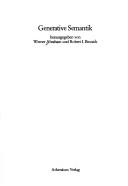
ISBN: 3761048114 9783761048115 Year: 1972 Volume: 11 Publisher: Frankfurt am Main Athenäum
Abstract | Keywords | Export | Availability | Bookmark
 Loading...
Loading...Choose an application
- Reference Manager
- EndNote
- RefWorks (Direct export to RefWorks)
| Listing 1 - 10 of 38 | << page >> |
Sort by
|

 Search
Search Feedback
Feedback About UniCat
About UniCat  Help
Help News
News